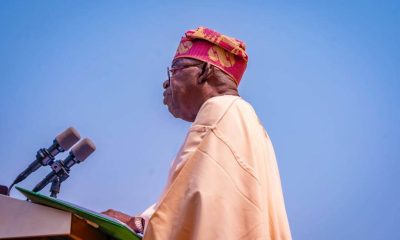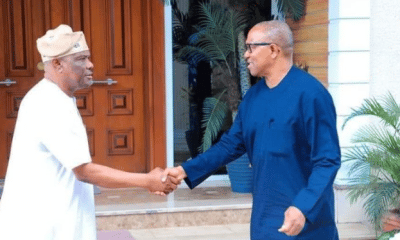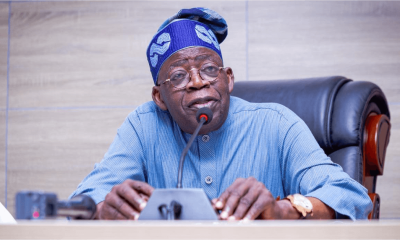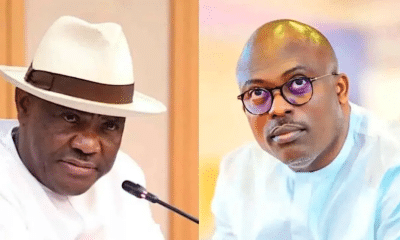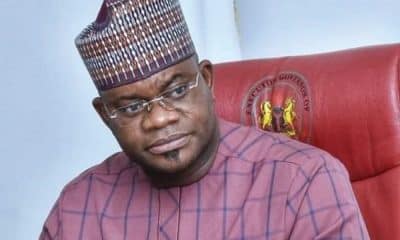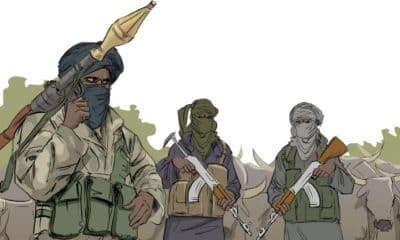Politics
Ajuri Ngelale Vs Bayo Onanuga: ‘Why Tinubu Sacked Chief Spokesman’ – Sources

President Bola Ahmed Tinubu’s Special Adviser on Media and Publicity, Ajuri Ngelale, did not resign as an aide to the president to address a “vexatious medical situation” in his family as he claimed.
According to the Foundation of Investigative Journalism (FIJ), sources revealed that he was dismissed by the presidency, but was given the opportunity to publicly resign after pleading for a softer exit.
Naija News reports that Ngelale, who also served as the special presidential envoy on climate action, shocked Nigerians on Saturday when he abruptly announced his departure, citing “medical matters presently affecting my immediate, nuclear family.”
He had said in a statement: “On Friday, I submitted a memo to the Chief of Staff to the President informing my office that I am proceeding on an indefinite leave of absence to frontally deal with medical matters presently affecting my immediate, nuclear family.
“While I fully appreciate that the ship of state waits for no man, this agonising decision — entailing a pause of my functions as the Special Adviser to the President on Media & Publicity and Official Spokesperson of the President; Special Presidential Envoy on Climate Action, and Chairman, Presidential Steering Committee on Project Evergreen — was taken after significant consultations with my family over the past several days as a vexatious medical situation has worsened at home.”
However, sources within the presidency revealed to FIJ that Ngelale’s departure was not due to a family health crisis, but rather the culmination of a power struggle with Bayo Onanuga, the Special Adviser on Information and Strategy.
According to insiders, following the election of Bola Tinubu as Nigeria’s president in 2023, Ngelale and Onanuga did not get along, largely because Ngelale, who had been appointed by President Muhammadu Buhari in 2019 as a senior special adviser on public affairs, considered himself superior to Onanuga.
Ngelale, 38, began his career with Africa Independent Television (AIT) in the 2000s, while Onanuga, 67, a former Managing Director of the News Agency of Nigeria (NAN), started his career in the 1980s.
Although Ngelale served as special adviser on media and publicity, and Onanuga as special adviser on information and strategy, civil servants found their roles confusing.
In the previous administration, Femi Adesina was the special adviser on media and publicity, while Garba Shehu was the senior special assistant. Everyone knew Adesina, as SA, was senior, and Shehu, as SSA, was subordinate.
With both Ngelale and Onanuga holding special adviser roles, the distinction wasn’t as clear. By default, the civil service structure reported to Ngelale, as SA on media.
“Ngelale considered himself untouchable because he had the backing of the president’s son Seyi and Femi Gbajabiamila, the president’s chief of staff,” a source disclosed. “He was fired; I became aware of this on Tuesday, but I won’t rule out the possibility that it happened earlier. When he got the letter, he started to plead to be allowed to resign as a soft landing. He was eventually given a soft landing, which is understandable. News of his sacking in public would have thoroughly embarrassed not just Ngelale but the presidency too.”
The source added that despite efforts by several top appointees and ministers to intervene in the feud between Ngelale and Onanuga, the conflict escalated.
“The Ngelale-Onanuga feud was no secret in the villa, so several top appointees and cabinet members attempted to intervene at separate times; and while Onanuga was open to peace talks, Ngelale wasn’t,” the source continued. “For example, Mohammed Idris Malagi, the minister of information and national orientation, called for talks four times. Onanuga was willing to attend but Ngelale snubbed them all, always claiming he was busy.”
Civil servants also noted that Onanuga, despite being appointed in October 2023, did not have his own office for months, while Ngelale had ensured his authority remained intact.
One insider explained, “When Onanuga was appointed, he had no office. He was squatting in Tunde Rahman’s office. It was just recently that he eventually got an office that belonged to either Wale Edun or Zacheus Adedeji when they were still advisers.”
Rahman, the senior special assistant to the president on media and publicity, had been appointed in July 2023, three months before Onanuga’s appointment.
Meanwhile, Zacheus Adedeji, who was appointed special adviser on revenue, and Wale Edun, special adviser on monetary policy, had both secured their roles in June 2023, months ahead of Onanuga.
Another source revealed that Ngelale’s powerful position was largely attributed to his backing from Seyi Tinubu and Gbajabiamila.
“During the 2023 presidential electioneering, Jumoke Oduwole, the special adviser on the Presidential Enabling Business Environment Council (PEBEC), introduced Ngelale to Gbajabiamila,” said the source. “When Ngelale got there, he met Seyi. He told Seyi he would facilitate a CNN interview during which Tinubu’s presidential ambition would be discussed. Seyi thought it was impossible, but Ngelale did it. He secured the interview on CNN. He then told Seyi the time and date it would air. Seyi promised Ngelale that Tinubu would phone him if he pulled it off. Immediately after the interview was aired, Tinubu called Ngelale.”
Following Tinubu’s election victory, Ngelale’s appointment was secured soon after his return to Nigeria. In contrast, Onanuga’s appointment was delayed for at least two months and required intervention from Chief Bisi Akande, a close ally of Tinubu.
Sources confirmed that Ngelale’s directive that no statement from Onanuga could be released without his approval had aggravated the situation.
The internal conflict and Ngelale’s difficult relationship with journalists and the media eventually damaged his standing with the presidency.
“He did not have a good relationship with journalists. Ask the reporters; ask the state house correspondents. And also ask editors,” one source said. “Many people consider him disrespectful and arrogant, even the editors. You can hardly find any important editor in Nigeria who likes or regards Ngelale.”
Efforts by FIJ to reach both Ngelale and Onanuga for comments were unsuccessful, as neither responded to messages or calls.

